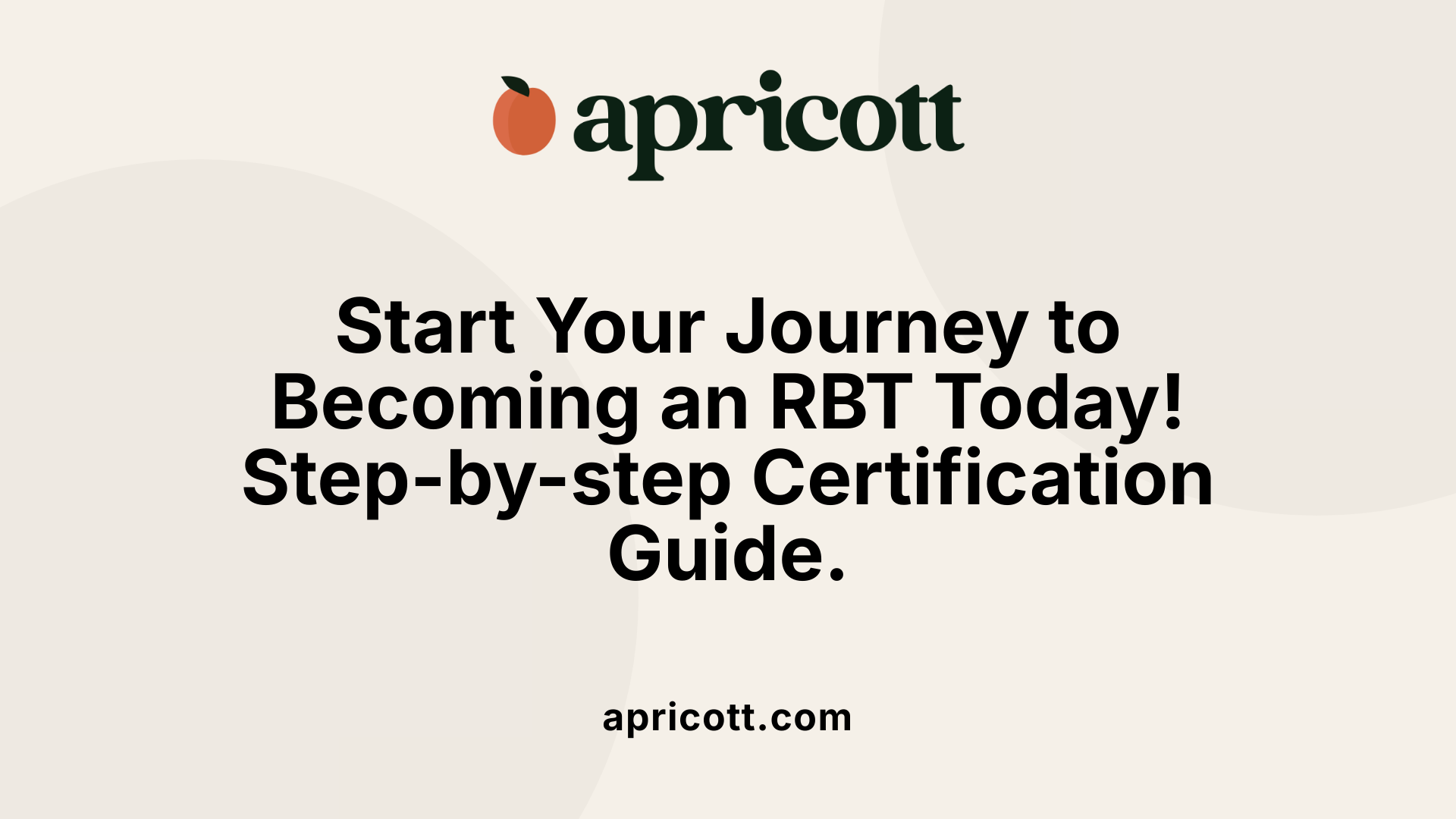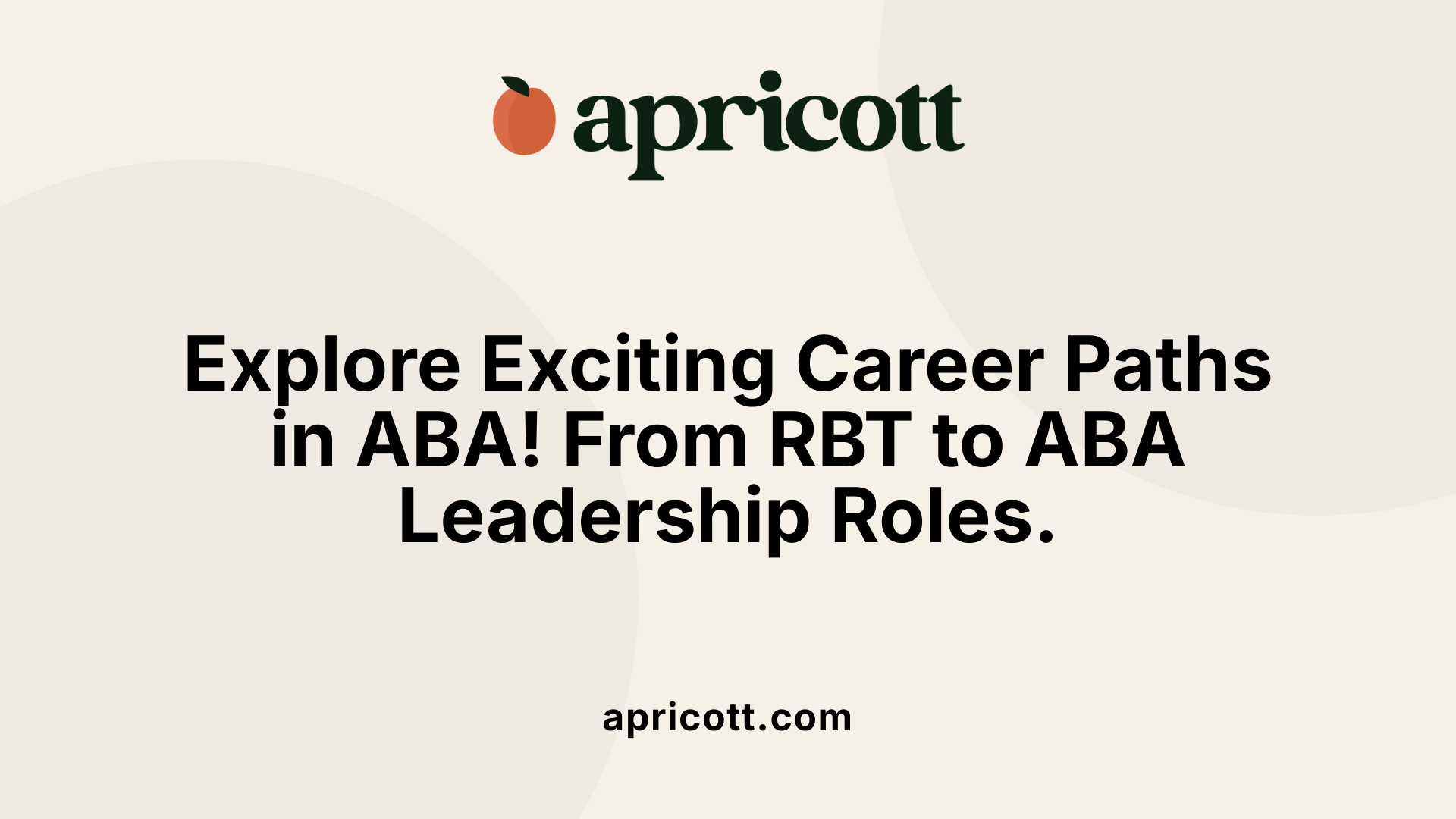August 26, 2025
Charting a Rewarding Journey in Behavior Analysis
The field of Applied Behavior Analysis (ABA) offers dynamic opportunities for those passionate about making a meaningful difference, especially through the role of a Registered Behavior Technician (RBT). This comprehensive guide explores the various career pathways, certification steps, skills needed, and resources available for aspiring and current RBTs, charting a course toward professional growth and specialization.
Becoming a Registered Behavior Technician (RBT) involves several steps aligned with the guidelines set by the Behavior Analyst Certification Board (BACB). To qualify, individuals must be at least 18 years old, hold a high school diploma or its equivalent, and pass a criminal background check.
The core of the certification process is completing a 40-hour training course that covers key topics such as ethics and behavior management, based on the RBT Task List. This training must be conducted by a BACB-approved provider and completed within 180 days. After finishing the coursework, candidates are required to conduct a competency assessment with a qualified BCBA or BACB certificant to demonstrate their practical skills.
Once the assessment is successfully completed, applicants submit an online application, providing documentation of their training and assessment. The final step involves passing the RBT Certification Exam, a comprehensive test covering various aspects of applied behavior analysis. Maintaining certification requires ongoing supervision and adherence to BACB ethical guidelines, along with annual renewal. This structured process ensures that RBTs are well-prepared to provide effective therapy services in diverse settings.

To qualify for RBT certification, applicants must be at least 18 years old and hold a high school diploma or an equivalent qualification. Meeting these educational standards is the first step towards entering the field of applied behavior analysis (ABA).
Prospective RBTs are required to complete a 40-hour training course provided by approved training providers. This training covers essential topics such as ethics, behavior management, and data collection methods. The coursework combines self-paced online modules with webinars and practical training sessions to ensure comprehensive understanding.
After completing the training, candidates must pass a competency assessment conducted by a qualified supervisor to demonstrate practical skills in implementing ABA procedures. Following this, applicants must sit for and pass the RBT Certification Exam administered by the Behavior Analyst Certification Board (BACB). Passing this exam confirms the individual's readiness to deliver ABA services effectively under supervision.
Other prerequisites include passing a criminal background check and committing to ongoing supervision and continuing education to maintain certification qualifications. The process generally takes about 6 to 8 months, depending on personal scheduling and pace.
Obtaining RBT certification opens the door to various entry-level roles in ABA therapy, such as working in centers, homes, or community settings. It also provides a foundation for further professional advancement, including pursuing higher certifications like BCaBA and BCBA, which can lead to supervisory and leadership roles.
| Step | Description | Additional Notes |
|---|---|---|
| Educational Requirements | High school diploma or equivalent | Minimum age 18 |
| Training Program | 40-hour coursework covering ethics, behavior management | Offered by approved providers |
| Competency Assessment | Practical skills evaluation conducted by supervisor | Ensures readiness for exam |
| Certification Exam | RBT certification exam administered by BACB | Necessary to earn professional status |
| Ongoing Supervision | Supervised practical experience for certification maintenance | Required for certification renewal |
This structured pathway ensures that aspiring RBTs are thoroughly prepared to deliver effective ABA therapy while providing a clear pathway for career development within behavior analysis.

Gaining hands-on experience is essential for advancing as an RBT. Many aspiring professionals seek supervised work placements or volunteer roles in clinics, schools, or community programs. These opportunities allow individuals to practice behavior intervention techniques, develop rapport with clients, and refine their skills under the guidance of experienced supervisors. Supervised experience not only builds competence but also boosts confidence and prepares candidates for the certification process.
Mentorship plays a vital role in an RBT's career development. Working closely with seasoned professionals provides valuable insights into effective behavior management, ethical practices, and data collection. BlueSprig, for instance, offers comprehensive training and mentorship programs that support new RBTs. Regular feedback from supervisors helps refine techniques, troubleshoot challenges, and adapt to diverse client needs. This on-the-job learning is crucial for mastering practical skills that textbooks alone cannot teach.
Creating a professional portfolio is an effective way to document your experience, skills, and achievements as you progress in your RBT career. A portfolio can include certifications, letters of recommendation, case studies, and records of supervision hours. It serves as both a personal development tool and a resource for applying to advanced roles or certifications such as BCaBA or BCBA. Demonstrating practical experience alongside continued education enhances your credibility and showcases your commitment to the field.
Successful RBTs possess a mix of personal qualities and technical abilities. Essential traits include empathy, patience, emotional maturity, energy, enthusiasm, adaptability, and a positive outlook. These qualities help build strong relationships with clients and motivate progress. Skill-wise, effective communication, data collection and analysis, critical thinking, and proficiency with technology are vital for designing and implementing interventions. Upholding ethics, confidentiality, and professionalism is fundamental, alongside resilience and emotional maturity to manage challenging situations effectively. Continuous learning and openness to feedback are crucial for long-term success.
 For Registered Behavior Technicians (RBTs), career growth can take several exciting paths. Many start by gaining experience under supervision, which prepares them for more senior roles. Progression to positions such as Senior RBT or clinical supervisor often involves additional training, certification, and leadership responsibilities.
For Registered Behavior Technicians (RBTs), career growth can take several exciting paths. Many start by gaining experience under supervision, which prepares them for more senior roles. Progression to positions such as Senior RBT or clinical supervisor often involves additional training, certification, and leadership responsibilities.
Specializing in niche areas like Autism Spectrum Disorder (ASD), developmental disabilities, or mental health disorders can make an RBT more valuable and open doors to specialized work environments. These niches often require specific knowledge but can significantly enhance career prospects and job satisfaction.
Beyond the RBT level, pursuing higher certifications such as the Behavior Analyst Certification Board’s (BACB) credentials — including the Board Certified Assistant Behavior Analyst (BCaBA) and the Board Certified Behavior Analyst (BCBA) — can dramatically widen job opportunities. These certifications demand advanced education, supervised work hours, and passing exams, but they also lead to roles with greater responsibility, higher pay, and the ability to supervise others.
In the ABA field, many RBTs move into mid-level roles such as clinical supervisors or program managers. Some transition into administrative positions like schedulers, intake coordinators, or billing specialists, broadening their professional skills.
Outside traditional ABA settings, opportunities abound in roles such as special needs nannies, respite care providers, paraprofessionals, teachers, or therapists in speech, occupational therapy, and recreational programs. These avenues provide diverse experiences and pathways for career development.
| Career Stage | Typical Roles | Additional Requirements | Possible Salary Range |
|---|---|---|---|
| Entry-Level | RBT Assistant | Complete 40-hour training, pass competency assessment | $30,000 - $50,000 |
| Mid-Level | Senior RBT, Supervisor | Additional certifications, experience | $45,000 - $65,000 |
| Advanced | BCaBA, BCBA | Master’s degree, supervised hours, exam | $60,000 and above |
| Specialized | Niches in ASD, developmental disorders | Specific training in niche | Varies |
Overall, the pathway from an RBT to advanced certifications and specialized niches offers clear opportunities for higher earnings, greater responsibilities, and expanded roles in various settings. Continual education, professional networking, and gaining practical experience are crucial in advancing in this rewarding field.

Yes, RBTs have the chance to specialize in specific areas within the ABA field. While their primary role involves supporting behavior analysts by implementing intervention plans and collecting data, many RBTs choose to develop expertise in particular populations or techniques.
One common area of specialization is working with individuals with Autism Spectrum Disorder (ASD). RBTs can deepen their understanding of ASD-specific interventions, helping to improve communication, social skills, and adaptive behaviors. Similarly, they can focus on growth in fields like developmental disabilities or mental health disorders, tailoring their approach to meet unique client needs.
Beyond niche populations, RBTs have options to pursue advanced certifications such as the Board Certified Assistant Behavior Analyst (BCaBA) or the Board Certified Behavior Analyst (BCBA). These certifications require additional education, supervised experience, and coursework, opening doors to leadership, supervision, and more complex intervention roles.
In terms of techniques and practices, RBTs can learn evidence-based methods like functional behavior analysis, discrete trial training, or natural environment teaching. Gaining expertise in these areas allows them to contribute more effectively to intervention plans and outcomes.
Many RBTs utilize continuous education—attending workshops, conferences, and reading industry publications—to stay updated on the latest practices. This ongoing learning helps them refine their skills and prepare for higher-level roles.
By specializing, RBTs not only expand their professional skill set but also increase their career prospects, gaining the ability to work with diverse client groups and contribute meaningfully to treatment success.
 What resources are available for RBTs looking to build or change their careers?
What resources are available for RBTs looking to build or change their careers?
RBTs interested in advancing or diversifying their careers can access a wealth of resources designed to support their professional growth. One primary source is the Behavior Analyst Certification Board (BACB), which provides official materials such as the RBT handbook, newsletters, and social media channels. These resources offer current information on certification standards, ethical practices, and industry updates.
Joining professional organizations enhances access to networking, mentorship, and ongoing education. Notable groups include the Association for Behavior Analysis International (ABAI) and the Association for Professional Behavior Analysts (APBA). Local ABA groups also facilitate community engagement and peer support.
Specialized training programs like Last Mile Training offer comprehensive coursework, supervised competency assessments, and exam prep tools tailored to help RBTs succeed in their certification and career progression. Online platforms provide study guides, practice exams, webinars, and access to industry journals, blogs, and apps that support continuous learning and skill development.
Participating in supervised work environments and pursuing advanced certifications such as the BCaBA or BCBA can further open doors to supervisory, leadership, and specialized roles. Additionally, attending conferences and workshops allows RBTs to stay current with best practices and networking opportunities.
In summary, these resources—official guides, professional associations, online courses, and industry events—are vital for RBTs aiming to build confidence, stay informed, and achieve career goals in behavior analysis and related fields.
Moving from an RBT position to higher roles in applied behavior analysis (ABA) involves several critical steps. First, obtaining additional certifications such as the Board Certified Associate Behavior Analyst (BCaBA) or the Board Certified Behavior Analyst (BCBA) is essential. This process requires pursuing relevant bachelor’s and master’s degrees in behavior analysis or related fields, completing coursework, and accumulating supervised fieldwork hours.
Preparing for and passing the respective certification exams demonstrate advanced knowledge and skills, paving the way for more responsibility. Gaining practical experience by working under supervision, perfecting skills like data collection, behavioral intervention, and client management further supports career advancement.
Engagement in continuous professional development—such as attending workshops, earning specialized certifications, and participating in conferences—enhances expertise and visibility in the field.
Opportunities for growth can also include leadership roles, such as supervising other therapists or managing programs, or starting private practices. Pursuing advanced training or specialization in areas like Autism Spectrum Disorder (ASD), developmental disabilities, or mental health can improve employability and earning potential.
Table 1 illustrates typical career progression in ABA:
| Role | Certification/Education Needed | Experience Required | Opportunities for Advancement |
|---|---|---|---|
| RBT | 40-hour training, competency assessment, background check | Entry-level, supervised work | Certificate renewal, skill development |
| BCaBA | Bachelor’s degree, coursework, supervised experience | Moderate experience, additional supervised hours | Leadership, specialized roles |
| BCBA | Master’s degree, coursework, supervised hours | Extensive supervised fieldwork | Senior roles, private practice, research |
In summary, career progression in ABA involves acquiring higher-level certifications through education, gaining relevant experience, and engaging in ongoing learning and professional activities. These steps open doors to leadership roles, specialization, and greater professional fulfillment.
The demand for Registered Behavior Technicians (RBTs) remains strong, reflecting a growing need for behavioral health services across various settings. With increasing awareness around autism spectrum disorder (ASD) and other developmental disabilities, opportunities for RBTs continue to expand, especially in centers, homes, and community programs.
As the field of Applied Behavior Analysis (ABA) evolves, ongoing education and certification are crucial for professionals aiming to stay relevant and advance their careers. RBTs are encouraged to pursue higher certifications like BCaBA and BCBA, which require additional coursework, supervised experience, and passing rigorous exams. These credentials open doors to leadership positions, specialized roles, and increased earning potential.
Advancing within ABA often begins with gaining practical experience and completing further education. RBTs should enroll in bachelor’s programs in behavior analysis or related fields, fulfilling coursework and supervised hours needed for BCaBA certification. For those seeking to become BCBAs, a master’s degree and supervised practicum are necessary.
Preparing for and passing the BCaBA and BCBA exams are vital milestones in this progression. As professionals improve their skills in data collection, behavior intervention, and client management, they can assume supervisory or leadership roles. Many also pursue specialized training to work with niche populations or in administrative capacities.
The employment outlook for RBTs and other ABA professionals is promising. As awareness around mental health and developmental challenges grows, so does the demand for trained practitioners. This trend is expected to continue, providing ample job stability and opportunities for new entrants.
Remaining current with industry standards and best practices is essential. Attending conferences, workshops, and professional seminars, as well as engaging with industry publications and networking through associations, helps practitioners stay informed.
| Career Stage | Typical Requirements | Opportunities | Progression Path |
|---|---|---|---|
| RBT | 40-hour training, high school diploma, background check | Entry-level ABA support roles | Certified after exam & supervision |
| BCaBA | Bachelor’s degree, coursework, supervised hours | Lead behavior programs, specialized work | Higher responsibilities & certifications |
| BCBA | Master’s degree, supervised hours | Managerial roles, private practice | Leadership, research, specialization |
In summary, a career in ABA offers a structured pathway for growth, driven by ongoing education, certification, and experience development. The future looks bright for those committed to making a difference and continuously improving their skills.
The pathway to a successful and fulfilling career in ABA as an RBT offers numerous opportunities for growth, specialization, and leadership. With the right training, continuous professional development, and strategic career moves, individuals can advance from entry-level roles to high-responsibility positions, including BCaBA and BCBA, or transition into specialized niches and organizational leadership. Staying informed through resources, engaging with professional communities, and pursuing higher certifications are key to long-term success in this dynamic and expanding field. The future of ABA is promising, with a growing demand for skilled practitioners dedicated to improving lives through evidence-based techniques.